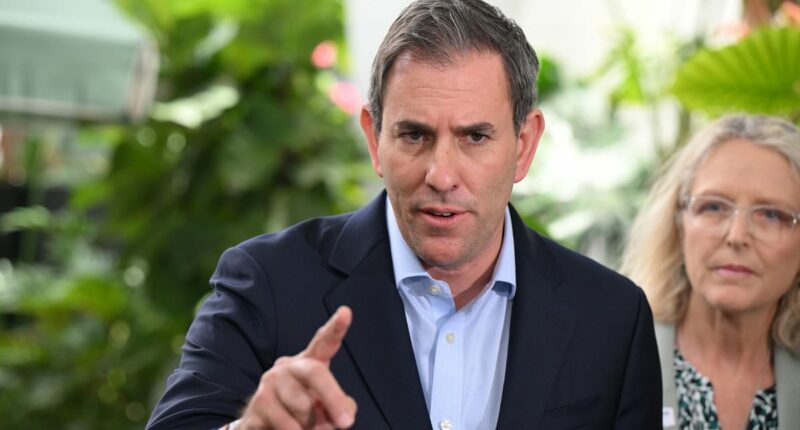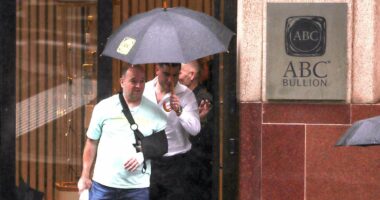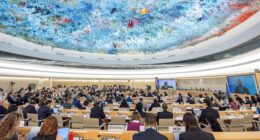Share this @internewscast.com
Treasurer Jim Chalmers faces increasing demands to curb Labor’s expenditures as the Reserve Bank of Australia (RBA) cautions that inflation will likely persist at higher-than-anticipated levels well into next year, causing real wages to decline.
This Tuesday, the RBA opted to maintain interest rates at 3.6 percent. However, its latest projections offer a bleak outlook for Australian households.
Inflation is now anticipated to remain above the RBA’s target range of 2–3 percent for at least another six to twelve months. This sustained high inflation is largely attributed to rising housing costs and escalating government spending on social services, such as the National Disability Insurance Scheme (NDIS).
RBA Governor Michele Bullock expressed surprise at the outcome, referring to the inflation spike as a “material miss” for the board.
“It’s possible that there’s no more rate cuts,” Bullock noted.
This decision is a setback for homeowners hoping for mortgage relief and poses a direct challenge to the Albanese government’s assertions of keeping inflation in check.
Chalmers faced a grilling in Parliament during question time and defended Labor’s record, but did note the pain many Australians were feeling following the move.
‘I acknowledge, and we acknowledge, that even with this progress we have made, Australians are still under pressure,’ Chalmers said on Tuesday.

Jim Chalmers (pictured) has been urged to slash spending, after inflation rose the last quarter
‘Those three interest rate cuts are providing a bit of relief, but we know that many Australians would have preferred to see more relief delivered today.’
Economists warn Labor’s key promise of real wage growth may need to be sacrificed to bring inflation under control.
The Reserve Bank has made it clear that without higher productivity, real wages cannot grow sustainably.
‘Public demand is expected to continue supporting growth, driven mostly by public consumption,’ the RBA said in its quarterly Statement on Monetary Policy.
‘Public consumption grew strongly in the quarter, as expected, driven by spending on social services.’
Liberal Senator and Opposition productivity spokesperson Andrew Bragg slammed the government for failing to lift productivity despite its much-publicised roundtable earlier this year.
‘Labor’s much-publicised productivity roundtable achieved nothing,’ Bragg said.
Shadow Treasurer and Deputy Liberal Leader Ted O’Brien accused Labor of fuelling the inflation crisis.

Michele Bullock (pictured) warned inflation would remain higher for at least 6 – 12 months
‘Labor’s spending spree left the RBA with no room to move today,’ he said on Tuesday.
‘Government spending is growing more than four times faster than the economy and is at its highest level outside of recession in more than four decades.’
The RBA’s decision statement echoed that caution.
‘The recent evidence of more persistent inflation, the board judged that it was appropriate to remain cautious, updating its view of the outlook as the data evolve.’
While forecasts for economic growth and unemployment remain largely unchanged, the RBA has significantly revised up its expectations for dwelling investment.
It now predicts growth of 4.8 per cent this year, up from 4.1 per cent, and 3.7 per cent by June next year, compared to a previous forecast of 2.2 per cent.
‘Higher expected housing prices have led to upward revisions to the expected level of household consumption and dwelling investment,’ the bank said.
‘The incentive to build more housing increases when the price of established housing increases relative to the cost of new housing.’

Andrew Bragg (pictured) criticised the government for failing to improve falling productivity
But that boom in housing investment comes with a warning, with new dwelling inflation expected to rise sharply as construction capacity is stretched.
The RBA also pointed to the Albanese government’s expansion of the first homebuyer scheme as a factor adding fuel to the fire.
‘It is difficult to quantify the expected effect of the scheme on housing demand, though it is likely to put at least some further pressure on housing and price growth,’ the bank said.
The government has continued to deny the scheme is increasing prices, standing by Treasury modelling that claims the 5 per cent deposit expansion would add just 0.5 per cent to house prices over six years, a claim refuted by a number of economists and the Opposition.
















